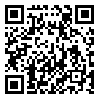Volume 20, Issue 6 (9-2021)
JRUMS 2021, 20(6): 613-630 |
Back to browse issues page
Download citation:
BibTeX | RIS | EndNote | Medlars | ProCite | Reference Manager | RefWorks
Send citation to:



BibTeX | RIS | EndNote | Medlars | ProCite | Reference Manager | RefWorks
Send citation to:
Mikaeili N, Eyni S. The Relationship between Spiritual Well-being of Veterans with Post-Traumatic Stress Disorder and Experimental Avoidance: The Mediating Role of Self-Efficacy: A Descriptive Study. JRUMS 2021; 20 (6) :613-630
URL: http://journal.rums.ac.ir/article-1-5937-en.html
URL: http://journal.rums.ac.ir/article-1-5937-en.html
University of Mohaghegh Ardabili
Abstract: (2472 Views)
Background and Objectives: Post-traumatic stress disorder in veterans is associated with low levels of spiritual well-being. Therefore, the present study aimed to determine the mediating role of self-efficacy in the relationship between spiritual well-being of veterans with post-traumatic stress disorder and experimental avoidance.
Materials and Methods: In this descriptive study, 200 veterans with post-traumatic stress disorder, who were hospitalized and treated in Isar Psychiatric Hospital in Ardabil in 2020, were selected as a purposive sample and examined. Paloutzian and Ellison's Spiritual Well-being Questionnaire, Acceptance and Action Questionnaire-Second Version of Bond et al.-, and the Sherer and Maddux Self-Efficacy Questionnaire were used to collect data. Data were analyzed using structural equation modeling.
Results: Based on the results, the causal model of the relationship between experimental avoidance, self-efficacy, and spiritual well-being in veterans with post-traumatic stress disorder was confirmed based on various fitting indicators. Experimental avoidance (β=-0.26, p<0.001) and self-efficacy (β=0.69, p<0.001) had a direct effect on the spiritual well-being of veterans with stress disorder. Also, experimental avoidance through self-efficacy had an indirect effect on the spiritual well-being of veterans with post-traumatic stress disorder (β=0.504, p<0.001).
Conclusion: In general, the results showed that experimental avoidance directly and indirectly and mediated by self-efficacy play a role in the level of spiritual well-being of veterans with post-traumatic stress disorder. It is recommended to hold training workshops to reduce experimental avoidance and increase self-efficacy and awareness of veterans with post-traumatic stress disorder of the effects of spiritual well-being on their quality of life.
Key words: Veteran, Spirituality, Experimental avoidance, Self-efficacy, Post-traumatic stress disorder
Funding: This study was funded by University of Mohaghegh Ardabili.
Conflict of interest: None declared.
Ethical approval: The Ethics Committee of University of Mohaghegh Ardabili approved the study (IR.ARUMS.REC.1399.528).
How to cite this article: Mikaeili N, Eyni S. The Relationship between Spiritual Well-being of Veterans with Post-Traumatic Stress Disorder and Experimental Avoidance: The Mediating Role of Self-Efficacy: A Descriptive Study. J Rafsanjan Univ Med Sci 2021; 20 (6): 613-30. [Farsi]
Materials and Methods: In this descriptive study, 200 veterans with post-traumatic stress disorder, who were hospitalized and treated in Isar Psychiatric Hospital in Ardabil in 2020, were selected as a purposive sample and examined. Paloutzian and Ellison's Spiritual Well-being Questionnaire, Acceptance and Action Questionnaire-Second Version of Bond et al.-, and the Sherer and Maddux Self-Efficacy Questionnaire were used to collect data. Data were analyzed using structural equation modeling.
Results: Based on the results, the causal model of the relationship between experimental avoidance, self-efficacy, and spiritual well-being in veterans with post-traumatic stress disorder was confirmed based on various fitting indicators. Experimental avoidance (β=-0.26, p<0.001) and self-efficacy (β=0.69, p<0.001) had a direct effect on the spiritual well-being of veterans with stress disorder. Also, experimental avoidance through self-efficacy had an indirect effect on the spiritual well-being of veterans with post-traumatic stress disorder (β=0.504, p<0.001).
Conclusion: In general, the results showed that experimental avoidance directly and indirectly and mediated by self-efficacy play a role in the level of spiritual well-being of veterans with post-traumatic stress disorder. It is recommended to hold training workshops to reduce experimental avoidance and increase self-efficacy and awareness of veterans with post-traumatic stress disorder of the effects of spiritual well-being on their quality of life.
Key words: Veteran, Spirituality, Experimental avoidance, Self-efficacy, Post-traumatic stress disorder
Funding: This study was funded by University of Mohaghegh Ardabili.
Conflict of interest: None declared.
Ethical approval: The Ethics Committee of University of Mohaghegh Ardabili approved the study (IR.ARUMS.REC.1399.528).
How to cite this article: Mikaeili N, Eyni S. The Relationship between Spiritual Well-being of Veterans with Post-Traumatic Stress Disorder and Experimental Avoidance: The Mediating Role of Self-Efficacy: A Descriptive Study. J Rafsanjan Univ Med Sci 2021; 20 (6): 613-30. [Farsi]
Keywords: Veteran, Spirituality, Experimental avoidance, Self-efficacy, Post-traumatic stress disorder
Type of Study: Research |
Subject:
روانپزشكي
Received: 2021/04/12 | Accepted: 2021/05/31 | Published: 2021/09/28
Received: 2021/04/12 | Accepted: 2021/05/31 | Published: 2021/09/28
Send email to the article author
| Rights and permissions | |
 |
This work is licensed under a Creative Commons Attribution-NonCommercial 4.0 International License. |








